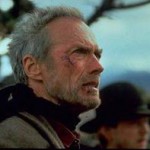Is Eastwood’s precaher a knight a ghost God The supernatural elements of the story are handled in a restrained, subtle manner that does not distract from the story, bringing a mythic dimension to the classic tale.
Letters from Iwo Jima (2006): Eastwood’s WWII from Japanese Perspective
All-American Clint Eastwood and foreign-language art cinema are not exactly the most congruent terms, and yet that's exactly what distinguishes “Letter from Iwo Jima,” his impressive companion piece to “Flags of Our Fathers,” which depicts the noted brutal battle from the Japanese perspective. The new picture displays other innovations: It's quiet, intimate, understated, and looks as if it were shot in black-white due to saturated colors.
Flags of Our Fathers (2006): Eastwood’s War Epic–Deconstructive Genre Movie
The most significant American film of the year. Effective as epic war film that reconstructs the cruel battle of Iwo Jima, and a sharp, timely deconstruction of how the battle and the iconic photo it produced were used and abused by the power elite, news media, and public at large.
Unforgiven (1992): Clint Eastwood Oscar-Winning Western, Starring Himself, Morgan Freeman and Gene Hackman in Oscar-Winning Performance
Dark and somber in thematics and visuals, this medidative narrative successfully deconstructs the mythic power of violence and the mythic role of the gunslinger, the two most prominent features of the Western genre.
Million Dollar Baby (2004): Clint Eastwood’s Masterpiece Oscar Card, Starring Eastwood, Hilary Swank, Morgan Freeman
Million Dollar Baby is an extremely well-directed and well-acted film in which the first reel is formulaic a la Rocky, the second reel a good boxing melodrama a la Girl Fight, and the third reel an intimate drama that matches in intensity Ingmar Bergman's best work.






